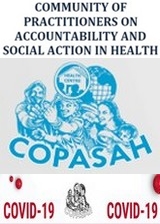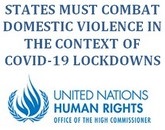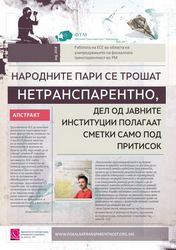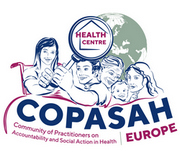Fiscal transparency is used as means to promote public sector governance, strengthen citizens’ voice to influence decisions that affect them, and ensure unhindered access to and exercise of social and economic rights for citizens.
ABOUT THE ISSUE
Low level and even regression of fiscal transparency represent a global issue that would have detrimental effect on limited access to the exercise of basic social and economic rights for citizens. Unfortunately, this trend has not circumvented the Republic of Macedonia. Fiscal transparency is at the bottom of the government’s list of priorities. In addition, the government does not demonstrate political will and capacity to deliver and to address demands and obligations related to the need for greater transparency. On the other hand, there are numerous barriers that prevent citizens to monitor public institutions’ operation and performance. Citizens are facing problems in relation to the exercise of their right to information; lack sufficient knowledge about their right to access to public information, and lack knowledge to understand information presented by public institutions in their documents; distrust the system and its institutions; and are not prepared to engage in the long bureaucratic process for free access to public information; while there are no mechanisms in place that would guarantee exercise of their right to access to public information.
Republic of Macedonia does not have in place effective and efficient mechanisms on monitoring budget execution and assessing efficiency and effectives of government’s policies. In addition, the system of public procurements and the manner in which they are implemented need to be strengthened, in order to ensure transparency, efficiency and effectiveness; address allegations on corruptive practices and violation of the principle on equal access to and equal treatment of participants in tender procedures.
Findings presented in Association ESE’s 2016 monitoring report on proactive transparency of institutions showed that “all institutions are marked by downward trend in terms of proactive transparency compared to the situation observed in the previous year”. Institutions in the Republic of Macedonia demonstrate low awareness about proactive transparency, which is evident in the fact that their websites do not host sufficient information on program and budget performance, i.e. information made publicly available concerns only 15% of their basic program and budget documents. As regards reactive transparency, ESE’s 2016 monitoring report showed that “institutions provide more information upon submission of requests pursuant to the instrument for free access to public information, instead of making this information available to the public on own initiative”. Institutions have demonstrated only partial compliance with the Law on Free Access to Public Information and partial transparency in their operation and performance.
In the case of public procurements, ESE’s monitoring reports on public procurements for the period 2011-2015 showed that public procurements in the public health system represent a grey zone in the Republic of Macedonia. Moreover, the reports showed that institutions with the highest number of public procurement procedures and the highest expenditure for procurement of goods, service and works are the least accountable institutions. Public health institutions have not published or have published just small portion of key information for as many as 70% of public procurement procedures.
WHAT WE DO ABOUT THIS ISSUE
We work on raising public awareness about the importance of fiscal transparency and the need for priority-based budgeting. In the last years, Association ESE has actively worked to assist citizens in exercising their right to information and access to public information and has facilitated communication between citizens and public institutions in the Republic of Macedonia. For that purpose, in 2014 we designed and launched the thematic website www.fiskalnatransparentnost.org.mk. This website features built-in electronic platform for submission of information requests under the instrument for free access to public information that could be addressed to all public institutions in the Republic of Macedonia, as well an built-in electronic platform for submission of appeals on the grounds of denied right to public information. The electronic platform is intended to assist the public, by facilitating streamlined submission of information requests and faster receipt of responses thereto issued by public institutions, but is also used to test reactiveness of public institutions, i.e. their preparedness to disclose information to the broader public. More specifically, we educate citizens about the procedure on exercise of the right to free access to public information by enabling electronic completion of templates for submission of information requests and templates for submission of appeals on the grounds of denied access to public information. Furthermore, Association ESE is committed to equipping all interested parties to monitor fiscal performance of the Government of the Republic of Macedonia and to actively participate in discussions on implementation of policies and improvement thereof. For that purpose, we have created an open fiscal database that allows streamlined, systematized and analytical overview of fiscal and budget data. Association ESE regularly updates this database with information collected as part of its monitoring on implementation of the Ministry of Health’s preventive healthcare programs.
Inter alia, the thematic website www.fiskalnatransparentnost.org.mk allows citizens access to information on obligations of public institutions, as well as their rights and entitlements arising from relevant legislation by hosting the clean copies of legal regulations in effect. ESE’s thematic website allows the citizen access to the most recent relevant literature and materials in the field of fiscal transparency, access to public information and citizens’ participation in policy and decision making processes, available both in Macedonian and English language, as well as key news and information on current developments in Macedonia and across the world.
Portion of activities related to public awareness and information dissemination to citizens about their rights and possibilities to access public information, as well as their participation in development, adoption and implementation of fiscal policies and exerting pressure on public institutions to comply with their transparency and accountability obligations include the campaign on promotion of fiscal transparency titled “Fiscal Transparency Macedonia”, which ESE has launched in 2015. As part of campaign activities and aimed to inform and provide citizens with visual contents, ESE has produced a series of education videos.
We assess the level of transparency and accountability of public institutions. Starting in 2013, we have continuously worked on assessing public institutions’ reactiveness and pro-activeness in terms of sharing and publishing information on their budget and program implementation, which is conducted on the basis of previously defined methodology. Proactive transparency is assessed by examining availability and format in which 16 key program and budget documents are published on official websites of 25 public institutions, including strategic plans, annual operation programs, proposed budgets, adopted budgets, proposed and adopted budget adjustments, end-of-year budgets, audit reports, civic budget, i.e. simplified version of the budget, contact persons and authorized persons for free access to public information, as well as the list of public information. On the other hand, reactive transparency of 68 public institutions is assessed against five parameters, those being: number of responses obtained in regular procedure; number of incomplete responses obtained in regular procedure; number of denied information requests or discontinued procedure on the part of information holders; number of information requests to which information holders responded with administration silence; and average period for issuance of response to information requests submitted under the instrument for free access to public information both in regular and appeal procedure.
It is important to note that Association ESE monitors only operation and performance of institutions covered by regular activities under its budget monitoring and analysis program, for example, implementers of the Program for Active Health Protection of Mothers and Children, Program for Early Detection of Malignant Diseases, Program for Systemic Check-Up of Pupils and Students and Program for Treatment of Persons with Rare Diseases or institutions responsible for policy and decision making aimed at promoting the health of women and children in the Republic of Macedonia. Hence, we monitor and assesse enforcement of the Law on Free Access to Public Information by all healthcare centres in Macedonia (32); all centres of public health (10); number of clinics, such as Clinical Hospitals in Bitola, Shtip and Tetovo, General Hospital in Strumica, Special Hospital on Gynaecology and Obstetrics “Chair”, University Clinic for Gynaecology and Obstetrics, and institutions that are considered decision and policy holders, such as the Ministry of Health, Ministry of Finance, Ministry of Labour and Social Policy, etc.
Monitoring findings and collected evidence are used by public institutions, civil society organizations and national media outlets as relevant source of information to present state-of-affairs and progress in actions taken by public institutions pursuant to the Law on Free Access to Public Institution; initiation and implementation of public sector reforms in this field; as well as initiation of steps to promote actions on the part of public institutions in procedures on free access to public information.
We advocate for increased level of fiscal transparency. Through established mechanisms on monitoring the state’s compliance with commitments assumed under international initiatives and acceptance of international standards in the field of fiscal performance and transparency and by using the instrument for development of “shadow reports”, Association ESE serves as check-and-balance for unequitable exercise of the fundamental human right to information and access to public information.
In addition, from 2014 ESE has actively participated in development, implementation and monitoring of measures under priority no. 5 (fiscal transparency) and priority no. 3 (access to information) under the Open Government Partnership. In particular, we recognized this initiative as possibility to present identified barriers in operation of the public system which, under different circumstance, would not have been acknowledged as necessary and priority by the public healthcare sector.
We actively initiate and participate in work groups tasked to draft legislative amendments and develop standards and systems to promote fiscal transparency.
Moreover, we implement joint actions to initiate changes, by building coalitions and delivering capacity building training to other domestic and regional CSOs profiled in this field of operation.

































